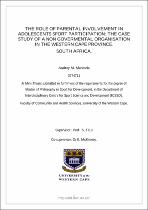| dc.contributor.advisor | Titus, Simone | |
| dc.contributor.author | Mahlaela, Audrey M. | |
| dc.date.accessioned | 2022-03-17T07:39:15Z | |
| dc.date.available | 2022-03-17T07:39:15Z | |
| dc.date.issued | 2021 | |
| dc.identifier.uri | http://hdl.handle.net/11394/8915 | |
| dc.description | Magister Artium (Sport, Recreation and Exercise Science) - MA(SRES) | en_US |
| dc.description.abstract | The world is home for 1.2 billion individuals aged between 10-19 years who have lived most of their lives under United Nations the Millennium Declaration, which has sought 2000 has sought a better world for all. In this context, parental involvement in sport for development can be looked at as a continuum ranging from not being involved at all, to over involved; from low to high, and from positive to negative. Positive parental involvement includes supporting a child through ways such as verbal encouragement, presence at a game and allowing a child to make his/her own mistakes. Negative behaviour involves directive behaviour and pressure to win and perform up to parent’s expectations. | en_US |
| dc.language.iso | en | en_US |
| dc.publisher | University of the Western Cape | en_US |
| dc.subject | Sport for development | en_US |
| dc.subject | Parenting | en_US |
| dc.subject | Children’s physical development | en_US |
| dc.subject | Adolescence | en_US |
| dc.subject | Western Cape province | en_US |
| dc.title | The role of parental involvement in adolescents sport participation: The case study of a non governmental organisation in the Western Cape province. South Africa | en_US |
| dc.rights.holder | University of the Western Cape | en_US |

